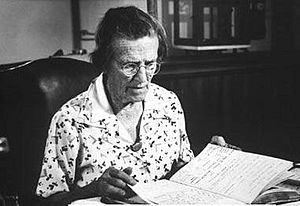Gertrud Theiler facts for kids
Quick facts for kids
Gertrud Theiler
|
|
|---|---|
 |
|
| Born | 11 September 1897 |
| Died | 2 May 1986 (aged 88) Stilbaai, South Africa
|
| Nationality | South African |
| Alma mater | BSc, South African College, 1918; D.Sc. University of Neuchâtel, 1922 |
| Known for | Parasitologist |
| Parent(s) | Sir Arnold and Emma Sophie (Jegge) Theiler |
Gertrud Theiler was a smart South African scientist and teacher. She lived from 1897 to 1986. She was famous for studying tiny creatures like nematodes (which are a type of worm) and ticks. Her work helped us understand these parasites better.
Contents
Early Life and Education
Gertrud Theiler was born in Pretoria, South Africa, on 11 September 1897. She went to Pretoria High School for Girls. After high school, she studied at Rhodes University College for a year.
Then, she moved to South African College in Cape Town. In 1918, she earned her Bachelor of Science degree there.
Studying Parasites in Europe
After her first degree, Gertrud went to Europe to study even more. She focused on helminthology, which is the study of parasitic worms. She studied at the University of Neuchâtel in Switzerland. In 1923, she earned her Doctor of Science degree.
Her special project for her doctorate was about worms that live inside horses in South Africa. She then continued her studies in London at important schools like the Liverpool School of Tropical Medicine. She wrote four important papers about the tiny parasites found in South African horses.
Teaching and Research Career
Gertrud came back to South Africa in 1924. She spent 17 years teaching biology to students. Her last two years of teaching were at Jeppe High School for Girls in Johannesburg.
In 1935, she became a Professor of Zoology and Physiology at Huguenot College in Wellington, South Africa. Later, in 1939, she lectured at Rhodes University.
Becoming a Tick Expert
After her teaching roles, Gertrud took on a research job. She joined the entomology (insect study) section at the Onderstepoort Veterinary Institute. For 25 years, she studied ticks there. She became very well-known around the world for her knowledge of ticks. She worked with other famous researchers like Jane Brotherton Walker.
Gertrud officially retired in 1967. However, she loved her work so much that she kept working at Onderstepoort. She continued as an emeritus faculty member until 1983. At that point, her hearing and eyesight made it too difficult to continue.
Helping Wildlife
Besides her scientific work, Gertrud cared a lot about nature. She was on the Council of the Wild Life Protection and Conservation Society of South Africa for 30 years. She also led the team that edited their magazine, African Wild Life. She helped start the Austin Roberts Bird Sanctuary in Pretoria.
Gertrud Theiler spent her last three years in Stilbaai, South Africa. She passed away on 2 May 1986.
Honours and Legacy
Gertrud Theiler received several awards for her important work.
- In 1960, she won the Captain Scott Medal from the South African Biological Society.
- In 1975, she received the Elsdon Dew Medal from the Parasitological Society of Southern Africa.
Gertrud Theiler Tick Museum
To honour her many years of collecting and studying ticks, a special museum was named after her. The Gertrud Theiler Tick Museum opened on 23 August 2005. It is located at the Onderstepoort Veterinary Institute in Onderstepoort, South Africa. This museum houses the South Africa National Tick Collection.
Ticks Named After Her
Two types of ticks were named after Gertrud Theiler to celebrate her contributions to tick research:
- The argasid tick Argas theilerae (also known as "Theiler's African white-backed vulture argasid").
- The ixodid tick Rhipicephalus gertrudae.
Family Connections
Gertrud Theiler was the youngest daughter of Sir Arnold Theiler. Her father was very important in veterinary science. He founded and was the first director of the Veterinary Institute, Onderstepoort. In 1971, Gertrud wrote a book about her father's life.
Her brother was the famous virologist Max Theiler. Max won the 1951 Nobel Prize in Physiology or Medicine. He received this award for developing the vaccine for yellow fever.
 | Chris Smalls |
 | Fred Hampton |
 | Ralph Abernathy |

